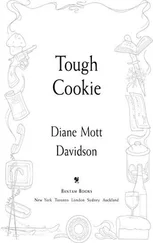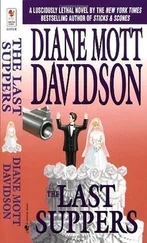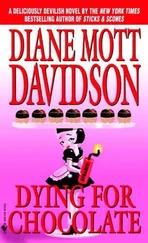Furry, impenetrable clouds obscured the stars. The light of the rising sun would not begin creeping over the mountains for nearly an hour. I tugged my hat down over my ears and struggled to work out the logistics of a predawn appearance at Hyde Castle.
I’d first visited the Hydes during a freezing, mid-January fog. At the time, I’d been grateful for Sukie Hyde’s call. Ever since the unfortunate New Year’s party at the Lauderdales’, I’d been low. When the police had refused to bring an assault case against me - Buddy had claimed I hit him when I tried to wrench little Patty away from him - the Lauderdales’ lawyer had begun calling me, threatening civil suits. Self-proclaimed friends of the Lauderdales had either snubbed me or scolded me for dragging the name of a longtime Saint Luke’s Episcopal Church and Elk Park Prep supporter through the mud. Forget low. Until Sukie called, my mood had been subterranean.
I’d known Sukie casually for the past two years, through Saint Luke’s. A widowed Swiss émigrée, she had married the reclusive Eliot Hyde a little over a year ago. Her call to me in January had been to announce that she and Eliot intended to turn his family castle into a retreat center for high-end corporate customers. They’d been remodeling the castle for months, and now Eliot was eager to move ahead with his plans for historic Elizabethan meals - meals that would eventually be served to conference clients. Was I interested?
I practically choked saying, You bet, yes, please, absolutely, I adore history and the food that goes with it!
I was desperate for the booking; I was also curious to see the lavish work on the castle redo. Rumor had it that Eliot and Sukie had already spent several million dollars. Everyone in town knew that Sukie was a cleaning and organizing whiz. And good old Eliot Hyde must have thanked his lucky stars, rabbit’s feet, and four-leafed clovers when Sukie’s reputation had proved true.
When Sukie first arrived in Aspen Meadow, the story went, she was bored. Her husband, Carl Rourke, had owned a successful roofing company that many local high-school students, including Julian, had worked for. Sadly, Carl had died on the job, in a freak electrical accident. After a year of widowhood, Sukie’s loneliness had made her restless. Figuring her obsessive tidiness ought to be worth something, she’d advertised to work as a personal organizer.
Her first and last client was Eliot Hyde. Never married, virtually penniless, Eliot was a former academic who had retreated to the castle he’d inherited after being denied tenure at an East Coast college. The castle itself, built in Sussex, had been bought by Eliot’s grandfather, silver baron Theodore Hyde, on a trip to England in the twenties. Belonging to a line of earls, the castle had been uninhabited since the time of Cromwell. Like the parvenus making social splashes with their enormous palaces in Newport, Rhode Island, silver-baron Theodore had apparently hoped his castle would give him the social cachet of an actual baron. He had the castle disassembled in England, then he hired a team to reassemble the royal residence in Aspen Meadow. He dammed up Fox Creek that flowed down the hill to the castle, to make a moat. He hired a fleet of servants to keep the place sparkling. Among his employees were a Russian fencing-master to teach him historic martial arts, and a butler to bring him tea and scones each day at four o’clock.
Unfortunately, Theodore and his wife Millicent had disliked tea and found fencing exhausting. The butler quit; the fencing-master, Michaela Kirovsky’s grandfather, became the castle caretaker. The Hydes, meanwhile, decided that what they really liked was collecting old European buildings. Once the castle was in place, they purchased a thirteenth-century French chapel that was a mini-version of Chartres. That Gothic jewel had been painstakingly reconstructed not far from the castle, on the Hydes’ sloping forty acres below Fox Creek and above Cottonwood Creek, the wide body of water that runs through Aspen Meadow. Then, before their dreams of purchasing a ruined abbey could be realized, Theodore and Millicent had both been killed in a railroad accident.
Their only son, Edwin - facing a Depression economy, played-out silver mines, and no financial assets aside from his parents’ estate - had tried to turn the castle into a hotel. This failed, as did mounting Aspen Meadow’s first and last circus on the castle grounds. After hiring ranchers to cart away mountains of elephant manure, Edwin and his wife had been reduced to charging for tours of the castle.
Their son, Eliot, had returned to the castle almost nine years ago, after his parents’ death and his own failure in academia. At thirty-nine, he hadn’t accumulated much in the way of savings, and those had drained swiftly away as he, too, struggled to make a living from giving tours and renting out the French chapel by Cottonwood Creek, now christened Hyde Chapel. By the time Eliot hired Sukie to organize the place, he’d stopped the tours and sunk into a depression. Income from renting the chapel was down, and stories in town had him living like a hermit in one room of his castle.
The family of the fencing-master, meanwhile, had been offered one whole wing of the castle rent-free, as long as they remained the caretakers. It was in their palatial fencing loft that young Michaela Kirovsky’s grandfather and father had taught her to fence, a skill that subsequently provided income for her, when she became the fencing coach at Elk Park Prep. Beside me, Arch was fast asleep. There was more to the tale of Eliot Hyde and Sukie Rourke. In fact, the months-old series of events were now routinely chronicled by townsfolk over coffee and doughnuts. Oddly, You can’t be too clean seemed to be the moral of the story.
When then forty-seven-year-old Eliot hired thirty-five-year-old Sukie, she had crisply informed him that she, would not work in the castle as long as the stench remained from the castle’s medieval toilets. Unfortunately, these thirty-three so-called “garderobes” - actually ancient narrow bathrooms corbeled out over the castle walls - had not been cleaned before leaving England. Also central to the Sukie story was an acknowledgment of one of the flaws of medieval military architecture: Each garderobe had its own shaft into the moat. Those shafts had proved a convenient, if messy, mode of entry to attackers of Richard the Lionheart’s Château Gaillard on the Seine, but Sukie hadn’t cared about old tales of invaders. Back in medieval days, each castle garderobe shaft emptied into a cesspit or the moat itself, both of which had been periodically cleaned out. But the medieval folks had not cleaned the garderobe shafts. Ever. After all these years, they still stank.
Yes, the story went, medieval courtiers had tossed down herbs, straw, and old letters to absorb some of the filth, but the latrine stench invariably sent foul smells throughout the castle. The British construction folks who’d taken the castle apart eighty years earlier to be shipped here to America had pulled down the shafts in sections. And the shafts had also been reassembled that way, much to Sukie’s disgust.
So: For Sukie’s first order of organizing business, she’d had each and every garderobe and shaft disassembled to be cleaned and disinfected.
And then. Think of flushing things down the toilet, I’d said to Arch, when Sukie’s subsequent discovery made national headlines. You might flush down things that made you angry, like a dunning bill for canceled phone service, or a Dear John letter from someone who’d sworn to love you forever. Or… say you received a letter from the government denying you guardianship of your beloved, orphaned nephew. That denial made you so enraged, you threw that bureaucrat’s epistle down the toilet shaft, where it… stuck… .
Читать дальше












